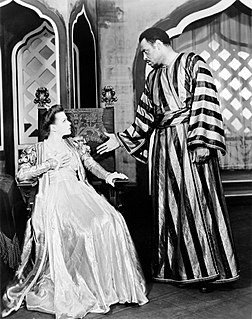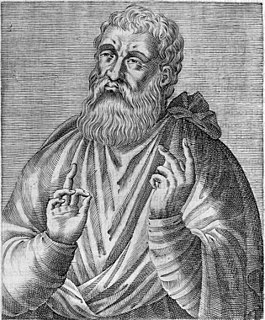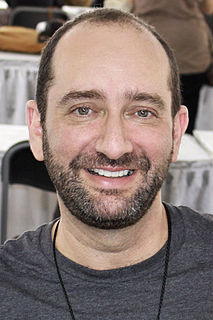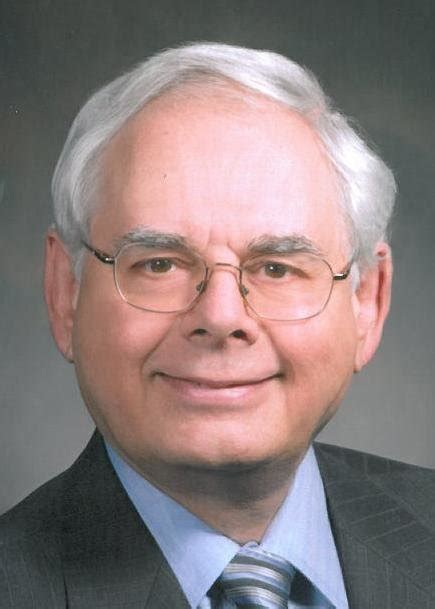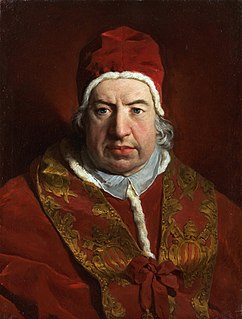Top 439 Greeks Quotes & Sayings - Page 7
Explore popular Greeks quotes.
Last updated on November 19, 2024.
Why did the old Persians hold the sea holy? Why did the Greeks give it a separate deity, and own brother Jove? Surely all this is not without meaning. And still deeper the meaning of that story of Narcissus, who because he could not grasp the tormenting mild image he saw in the fountain, plunged into it and was drowned. But that same image, we ourselves see in all rivers and oceans. It is the image of the ungraspable phantom of life; and this is the key to it all.
That devilish Iron Horse, whose ear-rending neigh is heard throughout the town, has muddied the Boiling Spring with his foot, and he it is that has browsed off all the woods on Walden shore, that Trojan horse, with a thousand men in his belly, introduced by mercenary Greeks! Where is the country's champion, the Moore of Moore Hall, to meet him at the Deep Cut and thrust an avenging lance between the ribs of the bloated pest?
One of the interesting things about the ancient Greeks is that they really didn't have our conception of individual rights. They didn't have our conception of all lives matters. And it was really was true for them, that certain lives matter a lot more than others. It didn't dawn on them that all lives, although different, can be lives of equal mattering. And that is actually something a huge ethical lesson.
The notion of travelling to far places in order to study alien peoples and cultures, is unique to Western man; it springs from the predatory genius of the Greeks; no primitive peoples have ever come to study us. This is, on the one hand, a disinterested, intellectually inspired impulse. It is one of our glories. But it is, on the other, part and parcel of exploitation. [] The Western obsession with inquiry, with analysis, with the classification of all living forms, is itself a mode of subjugation, of psychological and technical mastery.
A legacy that powerful does not disappear. Next to the Egyptians, the Greeks and Romans were babies. Our modern nations like Great Britain and America? Blinks of an eye...The very oldest root of civilization, at least of Western civilization, is Egypt. Look at the pyramid on the dollar bill. Look at the Washington Monument—the world’s largest Egyptian obelisk. Egypt is still.......very much alive.
I am not sure but I should betake myself in extremities to the liberal divinities of Greece, rather than to my country's God. Jehovah, though with us he has acquired new attributes, is more absolute and unapproachable, but hardly more divine, than Jove. He is not so much of a gentleman, not so gracious and catholic, he does not exert so intimate and genial an influence on nature, as many a god of the Greeks.
In building up a democratic model I think that Cuba's contribution, little by little, has contributed to getting closer to the ideals of those philosophers, of those Greeks who thought about how a society could be fairer, how a society could really represent the interests of the people. We have tried to get closer to that from a Latin-American perspective and from the Cuban perspective.
Physical fitness is not only one of the most important keys to a healthy body, it is the basis of dynamic and creative intellectual activity. The relationship between the soundness of the body and the activities of the mind is subtle and complex. Much is not yet understood. But we do know what the Greeks knew: that intelligence and skill can only function at the peak of their capacity when the body is healthy and strong; that hardy spirits and tough minds usually inhabit sound gods.
I am interested only in the relations of a people to the rearing of the individual man, and among the Greeks the conditions were unusually favourable for the development of the individual; not by any means owing to the goodness of the people, but because of the struggles of their evil instincts.With the help of favourable measures great individuals might be reared who would be both different from and higher than those who heretofore have owed their existence to mere chance. Here we may still be hopeful: in the rearing of exceptional men.
I do not feel that the West has really become less condescending toward foreign cultures than the Greeks and Romans were: it has only become more tolerant. Mind you, not toward Islam—only toward certain other Eastern cultures, which offer some sort of spiritual attraction to the spirit-hungry West and are, at the same time, too distant from the Western world-view to constitute any real challenge to its values.
The idea of childhood as a social invention, in retrospect, is hardly credible. In the Bible, in writings of the Greeks and Romans, and in the works of the first great educator of the modern era, Comenius, children were recognized as being both different from adults and different from one another with respect to their stages of development. To be sure, the scientific study of children and the increased length of life in modern times have enhanced our understanding of age differences, but they have always been acknowledged.
If you're creating a slave situation, you would almost never bring women. And if we look at Slavery for example, we look at the Greeks and the Romans, right? It was always men. They never brought any women. Because women carry the seeds of the revolution, right? And if you have the men by themselves, then you can do what the French did with the Blackfeet, which is breed them out.
The study of motivation goes back to the Greeks. Their sports were essential to their education. They saw in sports the integration of body, mind and soul, the creation of beauty, the mastering of athletics, and the challenge of competition. A French sociologist points this out. "Sports," he wrote, was part of the education of the citizen. He was expected to engage in exercise for a whole series of reasons that had to do with the shaping of the citizen; the relation between moral good and physical good; and the growth of a person.
Psychological factors are vital. We don't learn how to improve our emotional intelligence. Even in ancient cultures, such as the Greeks, cultivation of the art of being able to enter a state of awareness that is deeply blissful, and beyond thought and feeling as such. Many people have become disillusioned with religions and, as such, have turned away from pursuing anything spiritual. That create a loss of sense of purpose and a lot of anger. Sure, there are all sorts of problems with organised religions, but there are also all sorts of problems with the world of 'science' too.
The Parisian is to the French what the Athenian was to the Greeks: no one sleeps better than he, no one is more openly frivolous and idle, no one appears more heedless. But this is misleading. He is given to every kind of listlessness, but when there is glory to be won he may be inspired with every kind of fury. Give him a pike and he will enact the tenth of August, a musket and you have Austerlitz. He was the springboard of Napoleon and the mainstay of Danton. At the cry of "la patrie" he enrols, and at the call of liberty he tears up the pavements. Beware of him!
the Egyptians were the first to discover the solar year, and to portion out its course into twelve parts both the space of time and the seasons which they delimit. It was observation of the course of the stars which led them to adopt this divisionIt is also the Egyptians who first bought into use the names of the twelve gods, which the Greeks adopted from them
In this story, the sun moves. In this story, every night meets a dawn and burns away in the bright morning. In this story, Winter can never hold back the Spring... He is the best of all possible audiences, the only Audience to see every scene, the Author who became a Character and heaped every shadow on Himself. The Greeks were right. Live in fear of a grinding end and a dank hereafter. Unless you know a bigger God, or better yet, are related to Him by blood.
We're living in a Dark Age of macroeconomics. Remember, what defined the Dark Ages wasn’t the fact that they were primitive — the Bronze Age was primitive, too. What made the Dark Ages dark was the fact that so much knowledge had been lost, that so much known to the Greeks and Romans had been forgotten by the barbarian kingdoms that followed.
He raised an eyebrow. "You claim not to know me? Of course I'm Thoth. Also called Djehuti. Also called--" I [Sadie] stifled a laugh. "Ja-hooty?" Thoth looked offended. "In Ancient Egyptian, it's a perfectly fine name. The Greeks called me Thoth. Then later they confused me with their god Hermes. Even had the nerve to rename my sacred city Hermopolis, though we're nothing alike. Believe me, if you've ever met Hermes--
I've had lots of discussions with my Muslim brothers and sisters who have said to me, "Christianity is a white man's religion" But I'm like, "how is that possible when Christianity went into Africa before it ever went into central Europe?" Even the first people to become a Christian nation were not Romans, they weren't the Byzantines either, they weren't the Greeks... the first people to claim a Christian empire were the Armenians.
George was the easy part. As for Michael, I had always liked the name, and my father's brother is named Michael. I thought it was a good idea because there are a lot of Greeks in England with the second name of Michael; as a child I had a Greek friend whose second name was Michael. It was like getting the name that I wanted without having to get rid of the Greek element.
In every civilization, life grows easier. Men grow lazier in consequence. We have a picture of what happened to the individual Greek. (I cannot look at history, or at any human action, except as I look at the individual.) The Greeks had good food, good witty talk, pleasant dinner parties; and they were content. When the individual man had reached that condition in Athens, when the thought not of giving to the state but of what the state could give to him, Athens' freedom was doomed.
What I tried to show is that this idea of this fundamental conflict between savagery and civilization goes back to the very beginnings of Western history. I go back to the Greeks, I go back to the Romans. You can read Homer. And of course Homer has his great heroes involved in this myth, this wonderful mythic contest with savage tribal peoples, half-human monsters on distant parts of the world.
I guess you could say Alexander the Great was a man who completely transported me and moved me and inspired me because of his idealism, and I'd go back to the Greeks, and I always liked Homer and all the philosophers and their way of thinking and their concept of honor. I think their concept of honor does apply to the modern age, and certain people that walk around are pre-Christian.
There's love and there's romantic love. The Greeks had different words for different kinds of love. And we just got "love." I don't know what you would call the other kinds - maybe brotherly love, Christian love, the love of Saint Francis, love of everyone and everything. Then there's romantic love, which, by and large, is a pain in the ass, a kind of trauma.
The attempt to live that way, the attempt to treat everybody - it fails all the time - but the attempt to treat people as equals is a good attempt. It's a very good attempt. And there have been very few governments that have come anywhere near it in the past. The Greeks began to, the Romans began to - they both failed.
The epoch of doubt and transition during which the Greeks passed from the dim fancies of mythology to the fierce light of science was the age of Pericles, and the endeavour to substitute certain truth for the prescriptions of impaired authorities, which was then beginning to absorb the energies of the Greek intellect, is the grandest movement in the profane annals of mankind, for to it we owe, even after the immeasurable progress accomplished by Christianity, much of our philosophy and far the better part of the political knowledge we possess.
I would still be with you. But I could sleep outside, so it would not be so obvious. I do not need to attend your councils. I—' 'No. The Phthians will not care. And the others can talk all they like. I will still be Aristos Achaion.' Best of the Greeks. 'Your honor could be darkened by it." 'Then it is darkened.' His jaw shot forward, stubborn. 'They are fools if they let my glory rise or fall on this.
Alcohol makes other people less tedious, and food less bland, and can help provide what the Greeks called entheos, or the slight buzz of inspiration when reading or writing Visiting today's Iran, I was delighted to find that citizens made a point of defying the clerical ban on booze, keeping it in their homes for visitors even if they didn't particularly take to it themselves, and bootlegging it with great brio and ingenuity. These small revolutions affirm the human.
But for the Jews this moral-spiritual issue raises the same societal problem it does for the Greeks: how can a man have the "right" to make himself spiritually or rationally destitute or retarded when this corrupts the whole quality of the culture that we all together need and depend on? If anyone wants a cloistered and closed-minded life, an anti-aristic life, let him either go off and live among the wolves-or else join the community of like-minded idiots that (alas) compose and define the basic terms of modern society.
There is to me about this place a smell of rot, the smell of rot that ripe fruit makes. Nowhere, ever, have the hideous mechanics of birth and copulation and death -those monstrous upheavals of life that the Greeks call miasma, defilement- been so brutal or been painted up to look so pretty; have so many people put so much faith in lies and mutability and death death death.
As the Deity has given us Greeks all other blessings in moderation, so our moderation gives us a kind of wisdom which is timid, in all likelihood, and fit for common people, not one which is kingly and splendid. This wisdom, such as it is, observing that human life is ever subject to all sorts of vicissitudes, forbids us to be puffed up by the good things we have, or to admire a man's felicity while there is still time for it to change.
If Christianity cannot present evidence that the soul is immortal, then they have nothing to offer the masses, eternity in heaven with God or hold over their heads suffering forever in hell. They need the immortality of the soul. I did my research, it's not in the Bible, so what do they do? They relied on Judaism, which has always believed in the immortality of the soul. I start checking on that and I look in the Judaica Encyclopedia and what do I find? Their remark that Judaism probably got the immortality of the soul from the Greeks, so I go back further, where it all started with Plato.
The Greeks really believed in history. They believed that the past had consequences and that you might be punished for the sins of your father. America, and particularly New York, runs on the idea that history doesn't matter. There is no history. There is only the never-ending present. You don't even have your family because you moved here to get away from them, so even that idea of personal history has been cut at the knees.
The Greeks invented the idea of nemesis to show how any single virtue, stubbornly maintained gradually changes into a destructive vice. Our success, our industry, our habit of work have produced our economic nemesis. Work made modern men great, but now threatens to usurp our souls, to inundate the earth in things and trash, to destroy our capacity to love and wonder.
Collaborating with the musical genius of our time in some ways with Prince himself - late, great Gerald Levert,all these are forms of singing education, what the Greeks call paideia,that deep education to get us to shift from superficial things to serious things, to shift from bling-bling to life and death to justice and pain and joy, those fundamental, elemental things that we must come to terms with as we make our moves from our mother's womb to the tomb.
They [the mathematicians of the Enlightenment] defined their terms vaguely and used their methods loosely, and the logic of their arguments was made to fit the dictates of their intuition. In short, they broke all the laws of rigor and of mathematical decorum. The veritable orgy which followed the introduction of the infinitesimals... was but a natural reaction. Intuition had too long been held imprisoned by the severe rigor of the Greeks. Now it broke loose, and there were no Euclids to keep its romantic flight in check.
What is remarkable about the Greeks - even pre-philosophically - is that despite the salience of religious rituals in their lives, when it came to the question of what it is that makes an individual human life worth living they didn't look to the immortals but rather approached the question in mortal terms. Their approaching the question of human mattering in human terms is the singularity that creates the conditions for philosophy in ancient Greece, most especially as these conditions were realized in the city-state of Athens.
Since the time of the ancient Greeks a democracy has depended on its philosophers and creative artists. It can only flourish by continuous probing, prodding, and questioning of the social conditions under which man exists and tries to better himself. One of the first moves of a dictatorship is to stifle the artists and thinkers who have the ability to stir up dissent from any prescribed dogma which might enslave them. Because the artist can arouse the curiosity and conscience of his community, he becomes a threat to those who have taken power.
Because I know that the early Greeks and Romans and the early Europeans at that age did not see racism as we see it now - because racism was created to justify slavery to build the capital for capitalism - and back in the day they respected talent over race. We had an African Pope in the late 5th century, we had an African Emperor of Rome, and early church Fathers were black.
If some should accuse us as if we held that people born before the time of Christ were not accountable to God for their actions, we shall anticipate and answer such a difficulty. We have been taught that Christ is the first-begotten of God, and we have declared him to be the Logos of which all mankind partakes. Those, therefore, who lived according to reason (logos) were really Christians, even though they were thought to be atheists, such as, among the Greeks, Socrates, Heraclitus and others like them.
Since the Greeks the predominant attitude of thinkers towards intellectual activity was to glorify it insofar as (like aesthetic activity) it finds its satisfaction in itself, apart from any attention to the advantages it may procure. Most thinkers would have agreed with Renan's verdict that the man who loves science for its fruits commits the worst of blasphemies against that divinity. The modern clercs have violently torn up this charter. They proclaim the intellectual functions are only respectable to the extent that they are bound up with the pursuit of concrete advantage.
Crimea has always been and remains Russian, as well as Ukrainian, Crimean-Tatar, Greek (after all, there are Greeks living there) and German - and it will be home to all of those peoples. As for state affiliation, the people living in Crimea made their choice; it should be treated with respect, and Russia cannot do otherwise. I hope that our neighbouring and distant partners will ultimately treat this the same way, since in this case, the highest criteria used to establish the truth can only be the opinion of the people themselves.
To save the theatre, the theatre must be destroyed, the actors and actresses must all die of the plague. They poison the air, they make art impossible. It is not drama that they play, but pieces for the theatre. We should return to the Greeks, play in the open air; the drama dies of stalls and boxes and evening dress, and people who come to digest their dinner.
Answer my question, Bacchus. I’m not one of your dickless Greeks to be kept waiting for an answer. (Camulus) You better take a more civil tone with me, Cam. I’m not one of your flaccid Celts to shake in terror of your wrath. You want to fight, boy, bring it on. (Dionysus) Whoa, hang on a second. Let’s save the fighting for when you two take over the world, okay? (Styxx)
Greece, alone, is in a very vulnerable position. If the Greeks had had support from progressive left and popular forces elsewhere in Europe they might have been able to resist the demands of the Troika, but they had almost no support. Not even from Portugal, Spain, or other left forces. They were left alone.
I feel what they feel: man-hating, that volatile admixture of pity, contempt, disgust, envy, alienation, fear, and rage at men. It is hatred not only for the anonymous man who makes sucking noises on the street, not only for the rapist or the judge who acquits him, but for what the Greeks called philo-aphilos, 'hate in love,' for the men women share their lives with-husbands, lovers, friends, fathers, brothers, sons, coworkers.
The Greeks understood that mind and body must develop in harmonious proportions to produce a creative intelligence. And so did the most brilliant intelligence of our earliest days - Thomas Jefferson - when he said, not less than two hours a day should be devoted to exercise. If the man who wrote the Declaration of Independence, was Secretary of State, and twice President, could give it two hours, our children can give it ten or fifteen minutes.
While almost all men feel an attraction drawing them to society, few are attracted strongly to Nature. In their reaction to Naturemen appear to me for the most part, notwithstanding their arts, lower than the animals. It is not often a beautiful relation, as in the case of the animals. How little appreciation of the beauty of the landscape there is among us! We have to be told that the Greeks called the world Kosmos, Beauty, or Order, but we do not see clearly why they did so, and we esteem it at best only a curious philological fact.
The Greeks were smarter than us, and they had different words for different kinds of love. There's storge, which is family love. That's not us. There's eros, which is sexual love. There's philia, which is brotherly love. And then there's the highest form. Agape.” He pronounced it “aga-pay.” “That's transcendental love, like when you place the other person above yourself.
There are some arts which to those that possess them are painful, but to those that use them are helpful, a common good to laymen, but to those that practise them grievous. Of such arts there is one which the Greeks call medicine. For the medical man sees terrible sights, touches unpleasant things, and the misfortunes of others bring a harvest of sorrows that are peculiarly his; but the sick by means of the art rid themselves of the worst of evils, disease, suffering, pain and death.
Nietzsche inveighs against every sort of historical optimism; but he energetically repudiates the ordinary pessimism, which is the result of degenerate or enfeebled instincts of decadence. He preaches with youthful enthusiasm the triumph of a tragic culture, introduced by an intrepid rising generation, in which the spirit of ancient Greece might be born again. He rejects the pessimism of Schopenhauer, for he already abhors all renunciation; but he seeks a pessimism of healthiness, one derived from strength, from exuberant power, and he believes he has found it in the Greeks.
New media may at first appear as mere codes of transmission for older achievement and established patterns of thought. But nobody could make the mistake of supposing that phonetic writing merely made it possible for the Greeks to set down in visual order what they had though and known before writing. In the same way printing made literature possible. It did not merely encode literature.
We are wont to see friendship solely as a phenomenon of intimacy in which the friends open their hearts to each other unmolested by the world and its demands...Thus it is hard for us to understand the political relevance of friendship...But for the Greeks the essence of friendship consisted in discourse...The converse (in contrast to the intimate talk in which individuals speak about themselves), permeated though it may be by pleasure in the friend’s presence, is concerned with the common world.
The Greeks used to use the same stories, the same mythology, time after time, different authors. There was no premium placed upon an original story, and indeed, Shakespeare likewise. A lot of people wrote plays about great kings. They didn't expect a brand-new story. It was what that new author made of the old story. It is probably the same now. We disguise it by inventing what seem to be new stories, but they're basically the same story anyway.
It is ridiculous to believe that Greece might be taking in one million migrants, registering them, then giving refuge to those who have a right to asylum and sending everyone back that does not. Greece is not doing that. We can blame the Greeks for that, but at the same time we should change the Dublin Regulation. When we insist on this unrealistic procedure, it means nothing more than that we are defending Dublin while renouncing Schengen.
Since the Greeks, Western man has believed that Being, all Being, is intelligible, that there is a reason for everythingand that the cosmos is, finally, intelligible. The Oriental, on the other hand, has accepted his existence within a universe that would appear to be meaningless, to the rational Western mind, and has lived with this meaninglessness. Hence the artistic form that seems natural to the Oriental is one that is just as formless or formal, as irrational, as life itself.
Pope Gelasius in his ninth letter (chap. 26) to the bishops of Lucania condemned the evil practice which had been introduced of women serving the priest at the celebration of Mass. Since this abuse had spread to the Greeks, Innocent IV strictly forbade it in his letter to the bishop of Tusculum: 'Women should not dare to serve at the altar; they should be altogether refused this ministry.' We too have forbidden this practice in the same words.
The Greeks had two words for time. Chronos is the time we usually keep an eye on. Kairos was our participation of time. Time that moves us so that we lose our sense of time; timeless time; moments at which the clocks seems to stop; feeding, renewing, more motherly time. It's the time with which we feel one instead of outside of it, the self, the tao, the love that connects us to others.
You can learn technological things, you can learn about specific things, but the real problems that people deal with in any subject, existential subjects or romantic subjects, you never learn anything. So you make a fool of yourself when you're 20, you make a fool of yourself at 40, at 60 at 80. The ancient Greeks were dealing with these problems. They screwed up all the time. People do now.



































